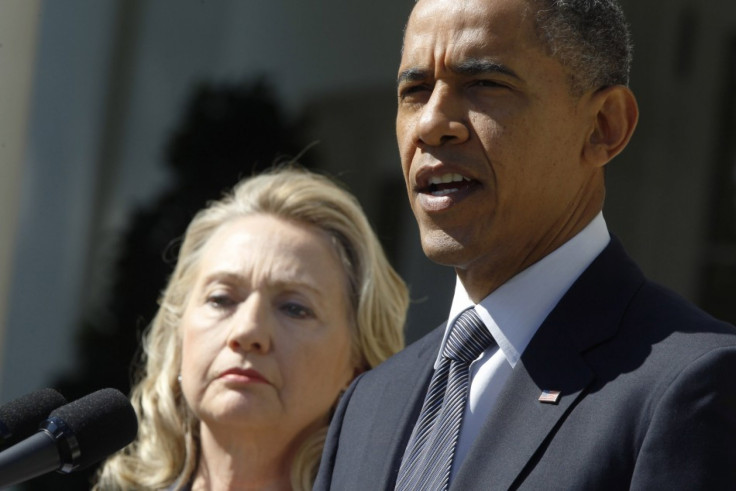Romney Continues to Blast Obama For 'Disgraceful' Libya Apology, But Republican Leadership Stays Silent

Republican presidential nominee Mitt Romney was quick to criticize the Obama administration following the attacks on U.S. diplomatic missions in Egypt and Libya on Tuesday, calling the administration's response to the attacks "disgraceful" and alleging it sympathized with the attackers.
Romney's comments came after Christopher Stevens, the U.S. ambassador to Libya, and three other staffers were killed in an attack by an angry mob in the U.S. consulate in Benghazi. The consulate was reportedly set on fire by protesters who were enraged by what they saw as an anti-Muslim film that depicts the prophet Mohammed as a fraud.
The attack in Libya came shortly after Egyptian protesters, in a separate incident, scaled the walls of the U.S. embassy in Cairo and tore down and then burned an American flag flying at half-mast for the anniversary of the Sept. 11 terrorist attacks.
The tragedy became fodder for the presidential election after Romney, in an initial response to the attacks, said the Obama administration was wrong to initially sympathize with the individuals who waged the attacks. While both of the candidates aimed to steer clear of partisan attacks Tuesday, Romney -- whose foreign policy inexperience was a frequent punch line used by Democrats at last week's Democratic National Convention -- likely jumped on a chance to appear engaged with international affairs.
President Barack Obama vowed Wednesday that the U.S. will work with the Libyan government to bring justice to the victims of the consulate attack. The president, who also said he "condemns in the strongest possible terms the outrageous and shocking" attack, said he ordered an increase in security at U.S. facilities overseas.
However, as several media outlets have pointed out, Romney's criticism actually referred to a statements released by the U.S. embassy in Cairo before the American officials were killed in Libya. The embassy, which sought to ease tensions with protesters, condemned the "continuing efforts by misguided individuals to hurt the feelings of Muslims -- as we condemn efforts to offend believers of all religions."
Although the Obama administration quickly disavowed the Cairo apology and said it "does not reflect the views of the United States government," Romney has not stepped back from his initial criticism. According to Politico, on Wednesday Romney claimed the Obama White House's attempt to distance itself from the Cairo statement "reflects the mixed signals they're sending to the world."
Republicans were quick to echo Romney's statements. Republican National Chairman Reince Priebus called the White House's response to the attacks "sad and pathetic" late Tuesday, a line repeated by other GOP figures such as Sarah Palin. However, Republican congressional leaders -- who usually aren't shy when it comes to calling out the president -- had not placed the blame on Obama as of Wednesday morning. Instead, House Speaker John Boehner, House Majority Leader Eric Cantor, and Senate Minority Leader Mitch McConnell called for stronger security at U.S. diplomatic facilities, the swift capture and punishment of the perpetrators and a renewed commitment to pro-democracy efforts in the Arab world.
This isn't the first time Romney has accused Obama of sympathizing with America's enemies. The Republican candidate has often repeated the claim that Obama "went around the world and apologized for America" following his election, an allegation that first appeard in his book, "No Apology: The Case for American Greatness."
But those speeches, according to Politifact, primarily centered on Obama's criticism's of the Bush administration's foreign policy stances. The website reports he never once used the word "sorry."
© Copyright IBTimes 2025. All rights reserved.





















